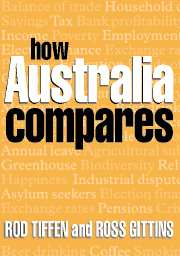Book contents
- Frontmatter
- Contents
- Reading the Tables
- Acknowledgments
- Abbreviations
- Introduction
- 1 People
- 2 Government and Politics
- 3 Economy
- 4 Work and the Labour Force
- 5 Government Taxes and Spending
- 6 Health
- 7 Education
- 8 Inequality and Social Welfare
- 9 International Relations
- 10 Environment
- 11 Science and Technology
- 12 Telecommunications and Computing
- 13 Media
- 14 Family
- 15 Gender
- 16 Lifestyles and Consumption
- 17 Crime and Social Problems
- 18 Religion, Values and Attitudes
- Sources and References
- List of Tables
7 - Education
Published online by Cambridge University Press: 22 September 2009
- Frontmatter
- Contents
- Reading the Tables
- Acknowledgments
- Abbreviations
- Introduction
- 1 People
- 2 Government and Politics
- 3 Economy
- 4 Work and the Labour Force
- 5 Government Taxes and Spending
- 6 Health
- 7 Education
- 8 Inequality and Social Welfare
- 9 International Relations
- 10 Environment
- 11 Science and Technology
- 12 Telecommunications and Computing
- 13 Media
- 14 Family
- 15 Gender
- 16 Lifestyles and Consumption
- 17 Crime and Social Problems
- 18 Religion, Values and Attitudes
- Sources and References
- List of Tables
Summary
Educational attainment
A complex sophisticated economy requires an educated labour force, while the capacity of an individual to survive and prosper in such a society also depends centrally on education. So educational attainment is one measure of the extent to which countries are developing and maintaining a highly skilled labour force and are offering their populations the opportunity for personal development. The tables on this page profile the differing educational attainments of the selected countries and how they have been changing in recent generations.
Each educational system grew up with its own assumptions and methods. But international bodies have devoted considerable attention to standardising the types of institutions and qualifications in different countries. While they are broadly comparable, one should not assume that someone graduating from secondary school in one country has exactly the same skills as the same graduate from another country, or equally that a high school graduate in 1954 has the same skills as one in 2004.
Table 7.1 shows the proportion of each country's adult population (aged 25–64) and the levels of educational attainment they have achieved. Because it shows a large age range all together, it is by nature a slow-moving indicator, reflecting the legacy of past educational practice more than recent performance. Table 7.1 is testimony to just how much attitudes to education varied among these countries. Most basically, it shows how America was the first to democratise access to the upper levels of education.
- Type
- Chapter
- Information
- How Australia Compares , pp. 119 - 136Publisher: Cambridge University PressPrint publication year: 2004



